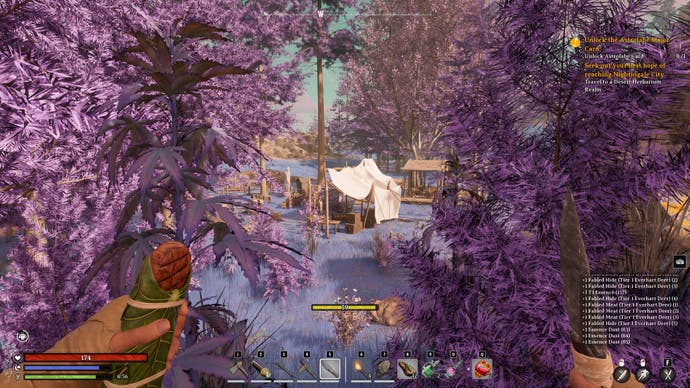What we've been playing
A few of the games that have us hooked at the moment.
1st March 2024
Hello! Welcome back to our regular feature where we write a little bit about some of the games we've been playing over the past few days. This week: faewilds, tins, and liars.
If you fancy catching up on some of the older editions of What We've Been Playing, here's our archive.
Nightingale, PC
I've been playing Nightingale for a couple of days fairly intensely now, and I'm not entirely sure what to make of it. It starts off really brightly, really full of, apparently, interesting new ideas. A Victorian setting, a faerie realm story idea, where everyone is scattered across these pocket realms, trying to find their way home. There's a semblance of story here, a whiff of RPG to go with the survival crafting core, and a clever card-based mechanic for generating your own realms and then messing with them. And yet, two days later, I'm still waiting for the game to hit its stride.
I'm under the impression it gets better, and that when you get into the mid-game and beyond, it comes into its own. But it's - as Matt wrote in his preview - getting to the mid-game that's the issue. It's a real trudge up to that point. It's the endless 'go craft something else' treadmill of survival that keeps slowing everything down.
For instance: at one point you'll have to up your gear score, as in a game like Destiny, and to do so, you'll need to collect essences from killing enemies. They don't always drop, though. It's 40 essences to upgrade one item, so you begin to see the laboriousness involved.
There's a lot more I'll talk about in a fuller piece, but like I say: many bright ideas. I'm just not sure if I'm actually having fun.
-Bertie
Tinderblox, tabletop
Tinderblox is a little game that comes in a tin. The tin's stuffed with pieces and cards and a pair of plastic tweezers. I've been after a game I can just carry around with me for a while, and Tinderblox is almost that game. I just think the tin is slightly too big.
The closest comparison to the game itself is probably Jenga. Tinderblox is about building a campfire. You and a few other players take turns drawing cards that tell you which blocks to add to the growing fire. There are logs and flame blocks, and often you'll need to pair a log with a flame and add it as a single piece. You do this with the tweezers, finding a spot on the existing fire and then trying to get your new pieces balanced. If you drop a piece when you're placing it or if you knock something else off the fire, you're out.
What elevates this, though, is a little icon that's sometimes in the corner of the card you turn over. This tells you whether you have to shift to using your non-dominant hand to place the blocks on the fire. I don't know what it is, but as soon as I have to use my left hand rather than my right, my adrenalin spikes, and I can't stop laughing. So I often laugh myself to disaster in Tinderblox. All good. I just wish the tin was a bit smaller.
-Chris Donlan
Avalon, tabletop
Avalon is basically Traitors, right? It's built on the same concept: social deduction, the same thing powering Werewolf and Wink Murder and whatever else you want to pull into that vortex.
The first time I played Avalon was at Tom Phillips' stag do, funnily enough - he'll love that I'm writing about that here - and I was amazed at how immediate and powerful the experience was. You don't expect it; the default Avalon box, with a generic fantasy lady on it, is about as boring as it comes, and yet! Inside lurks a game of lies and betrayal, just like in Traitors.
The idea, broadly, in Avalon, is that you are King Arthur's merry band of knights and you have to successfully complete missions, but if there's a villain, a traitor, in your midst, they can fail the missions so you need to weed them out. You need to be sure who you're sending on the mission before it begins, otherwise you're in danger. There are all kinds of permutations to this, the core idea complicated over time for those who want more of a challenge, but that's it in essence.
What amazes me about it - just like it did the first time - is how quickly it ensnares people. There's something so fundamental to us about defending an accusation of lying, that we can't help it. Case in point: we roped my Dad in over Christmas, and board games aren't really his thing, but within an instant, he was pointing fingers and levelling accusations just like people do in Traitors. And it's that core concept I think we all relate so strongly to in the TV show.
Traitors didn't originate any of this, then, but it's opened up a whole new audience to it. I can't wait for the Avalon game we've scheduled to play next week.
-Bertie










.png?width=291&height=164&fit=crop&quality=80&format=jpg&auto=webp)